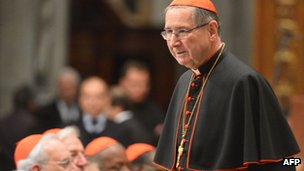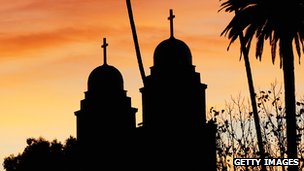Papal Conclave: LA Catholics" Turmoil at Sex Abuse Past
By Jane Little
While their former archbishop takes part in the conclave to choose the next pope, Catholics in Los Angeles deal with his complicated legacy. Will clergy sexual abuse - and its cover-up by church elders - harm the Church beyond repair? The Church of the Good Shepherd in Beverley Hills has seen a few popes come and go. This pretty Spanish mission-style church has been here since 1923. Hollywood stars have been married in front of its altar. The funerals of Rudolph Valentino, Frank Sinatra and Alfred Hitchcock were held here. Today its congregation is diverse: no famous faces in sight, but a mix of old and young, rich and poor, white and Hispanic - a mirror of the wider Catholic population. Here in the City of Angels, 40% of the population is Catholic. The Los Angeles Archdiocese is the largest in the US, representing five million souls. It is also one of the most shaken by the crisis of clergy sexual abuse. As the church leadership calls for prayers for the cardinal-electors in Rome, the congregants share a widespread concern among American Catholics that the leadership needs first to reform itself. "Growing up in the Church, they said ''fess up to your sins and then move on'," says Francisco, a film producer. "That's what the Church needs to do." Cover ups and courts If the focus of the attention was at first on the priests accused of sexual abuse, it has now shifted to the hierarchy - and to its flawed handling of those priests. Only this year has the extent of the cover-up in this archdiocese - and the local archbishop's role in it - come to light. Before his retirement in 2011, Cardinal Roger Mahony was the popular archbishop here. For much of his 26 years in that role, he was seen as a champion of immigrant rights and social justice. He also did a great deal to protect accused clergy from the law. In January, a court forced the release of thousands of Church files. They revealed extensive efforts by Cardinal Mahony and other Church officials to shield priests suspected of sexual abuse. In some cases they sent clerics out of state or even out of country to avoid criminal investigations. In one 1988 memo, the Reverend Thomas Curry, a former top aide to then-Archbishop Mahony, wrote about a priest accused of molesting 20 altar boys in nine months. "The whole issue of our records is a very sensitive one, and I am reluctant to give any list to the police," wrote Father Curry. "We cannot give such a list for no cause whatsoever," Archbishop Mahony responded. After the files were made public, Thomas Curry resigned from his post as auxiliary bishop of Santa Barbara. Cardinal Mahony was promptly stripped by his successor of all public and administrative duties. He responded to the public rebuke by defending his record. In an open letter to Archbishop Jose Gomez, who took over the archdiocese in 2011, he wrote: "Unfortunately, I cannot return now to the 1980s and reverse actions and decisions made then. But when I retired as an active archbishop, I handed over to you an archdiocese that was second to none in protecting children and youth." 'Slap in the face' The rebuke was, however, largely symbolic. Cardinal Mahony remains a "priest in good standing", according to the church. At 76, he is still eligible to vote in the conclave. He went to Rome, sparking protests at home. "It's a slap in the face to us victims," says Esther Miller. She is one of 508 victims of alleged abuse, to whom the Los Angeles Archdiocese collectively paid a record-breaking $660m (?438m) in 2007. "I don't believe Mahony has the moral authority to sit there and vote for the next pope," she says. "The people in the pews are owed transparency." Since the worldwide crisis erupted in Boston in 2002, the US Conference of Catholic Bishops has led the way in creating new guidelines for child protection and for dealing with accused priests. And last year, Philadelphia's Monsignor William Lynn became the first church official jailed for his part in a cover-up. But the scandal has cost the Church dearly - in dollars and in reputation. For some Catholics, the hierarchy's response of reflects a broader crisis in its leadership. Sister Judy Vaughan is helping volunteers serve spaghetti bolognese to children and their mothers gathered in the kitchen of Alexandria House.
She founded this homeless shelter in Los Angeles in 1996, and most of those who live here are survivors of domestic abuse. Sister Judy, 67, belongs to the Sisters of St Joseph of Carondelet. She does not wear a habit and lives in the shelter. She says the all-male hierarchy is preoccupied with its own power and has lost the mission of the faith - to serve the poor. "Even in their numbers they are not reflective of the Church," she says of the 115 cardinals gathered in Rome. "I'm Catholic to the core but the institutional Church has proven to be to so many of us irrelevant because of their practice and their teachings." Most Catholics in America favour some reforms in the Church. A majority support married priests. Many want a change in positions on contraception. But according to a new survey by the Pew Forum, Catholics in the US view the crisis of clerical sexual abuse as the most important challenge facing the Church. A third of respondents identified that scandal as the key priority. Second on the list, 9%, selected "dishonesty/low credibility/low trust" as the main problem. Yet in spite of the revelations, the resignations, and the multi-million dollar civil settlements that have forced the sale of Church assets across the country, no strong evidence has emerged that the abuse crisis has driven many from the faith. Monsignor Thomas Wilbers, who leads the congregation at the Church of the Good Shepherd, takes the long view. "It certainly is a major crisis for the Church. But the Church has weathered crises perhaps even stronger than this one throughout its history," he says. "After all, Roman emperors said the Church was finished. It wasn't, and I don't think it is now." For now, America's Catholics can only watch and wait to see in which direction the Church is heading.
|
.
Any original material on these pages is copyright © BishopAccountability.org 2004. Reproduce freely with attribution.

